Mentee: Cynthia Wong, Yarra Valley Water
Mentor: Karen Dickinson – Department of Environment, Land, Water and Planning
From selfies to goals:
In February 2020, Cynthia and Karen developed their mentoring partnership objective when they discovered during the commencement workshop at the Warrnambool Surf Life Saving Club that they both had aversions to featuring in social-media and videos professionally. Cynthia had never volunteered to be in a selfie and could not understand the appeal of an Instagram account. Whilst Karen loves a bit of Instagramming, the thought of being recorded on video was enough to stop her from applying for professional development opportunities. However, they both agreed that social-media and videos are a powerful platform to story tell and engage communities for positive change, and they had to somehow get with the times!
By combining the main message of the workshop – to start with understanding the ‘why’ – and their reluctant admission that multi-media skills are important for effective stakeholder engagement, they developed their main goal of the mentoring partnership:
The Project:
Cynthia’s project was to develop Integrated Water Management (IWM) plans for some sub-catchments in Melbourne’s east in collaboration with stakeholder organisations, Traditional Custodians and the community. This is a project in the DELWP IWM Yarra Forum Strategic Directions Statement (2018). As it is a multi-year project, the goal for the Twinning nine-month mentoring program would assist with the foundational step of assisting stakeholders to identify the ‘why’ to engage in the collaborative IWM planning process.
The Idea:
In Warrnambool, their idea was to create multi-media content such as videos of the sub-catchments with commentary to assist stakeholders to understand why a collaborative IWM planning process would achieve better outcomes for the environment and the community compared to organisations generally working in isolation.
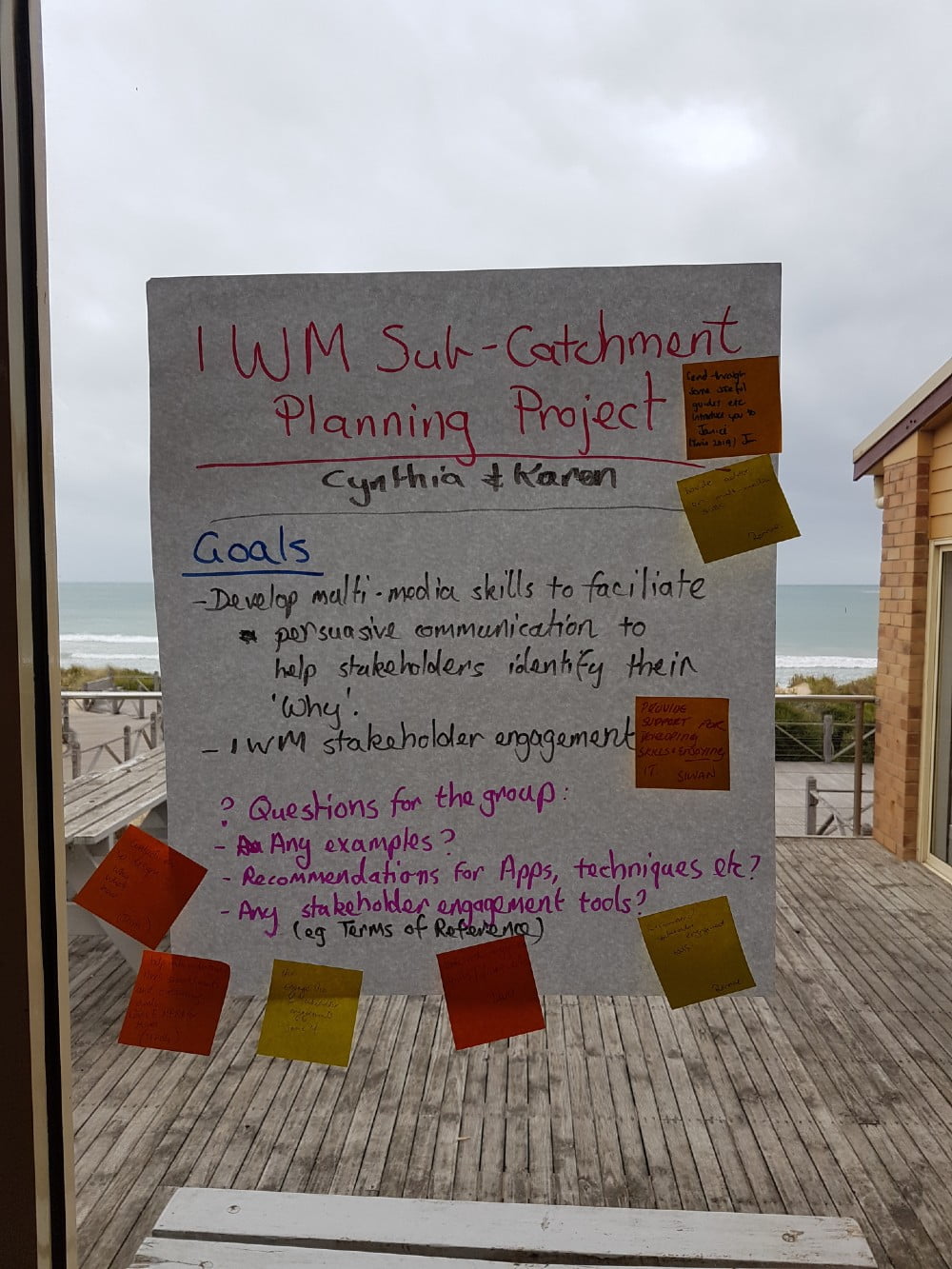
Surfing the waves and hitting the snow slopes!
Cynthia admired how students at Warrnambool go surfing in the morning before school. She was not aware that in about one month the whole world would be surfing waves of the Coronavirus (COVID-19) pandemic together.
In March, the pandemic saw Karen and Cynthia under strict lockdown restrictions in Melbourne which forced them to work from home, conduct home-schooling and limited their ability leave home. When the first wave in Victoria subsided in May, they conducted a socially-distanced walking / exercise meeting around Bolin Bolin Billabongs which is a place of significance for the Wurundjeri people near the Koonung Creek sub-catchment. During that walk, they were able to explore and understand the Aboriginal cultural values of the billabongs, discuss the challenges of implementing IWM and the importance of Traditional Custodian engagement.
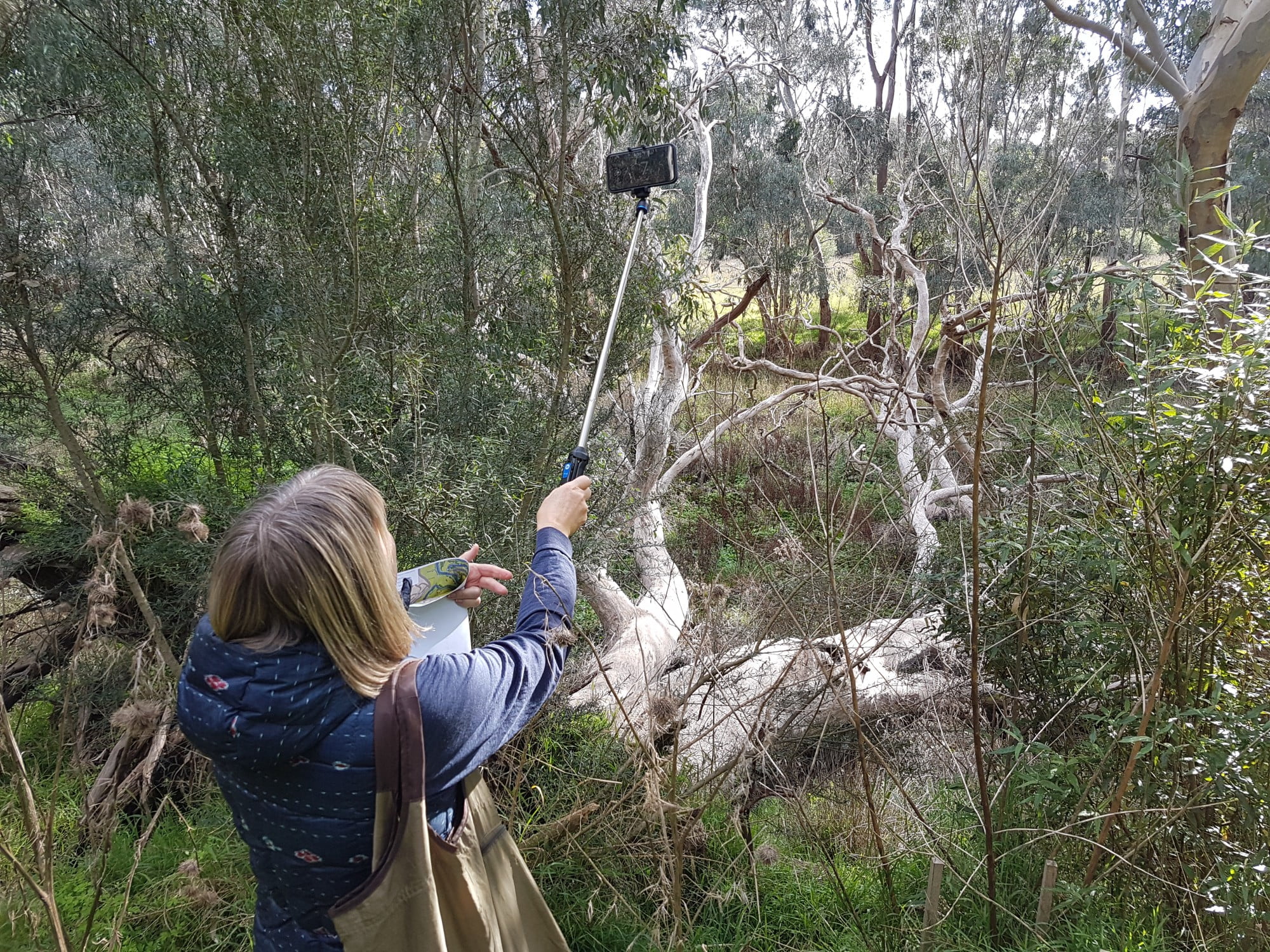
They were unaware at that time that another more significant second wave of COVID-19 would start about a month later that required even stricter lockdown. Those restrictions really impacted on their ability to accomplish the original concept of meeting face-to-face on site and developing video content together.
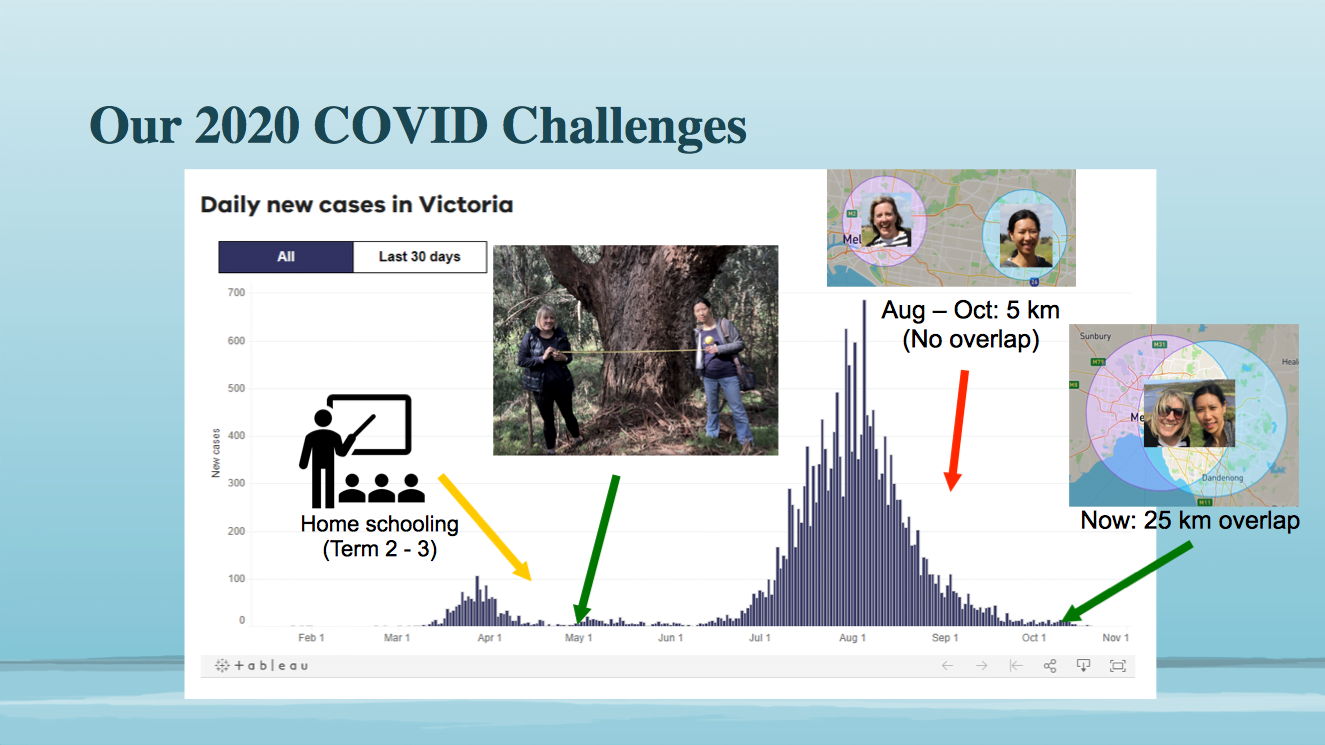
Side effects of the lockdown ‘medicine’ to ‘treat’ COVID-19
Ironically, the lockdown requirement to work from home enforced hundreds more video camera hours than their original idea of creating video content for stakeholder engagement. Together they supported each other through the lockdown in ways beyond original expectation of the mentoring program including:
- Navigating the challenges of home-schooling.
- Providing a regular fortnightly contact with someone else outside their immediate family experiencing the lockdown.
- Helping each other get comfortable with video meetings and using online tools like MS Teams.
This supportive relationship also built trust which allowed both of them to explore professional challenges and share insights which often are unspoken in the office. Our trust even allowed us to secretly hatch a plan to successfully sneak away from the lockdown to hit the ski slopes together!
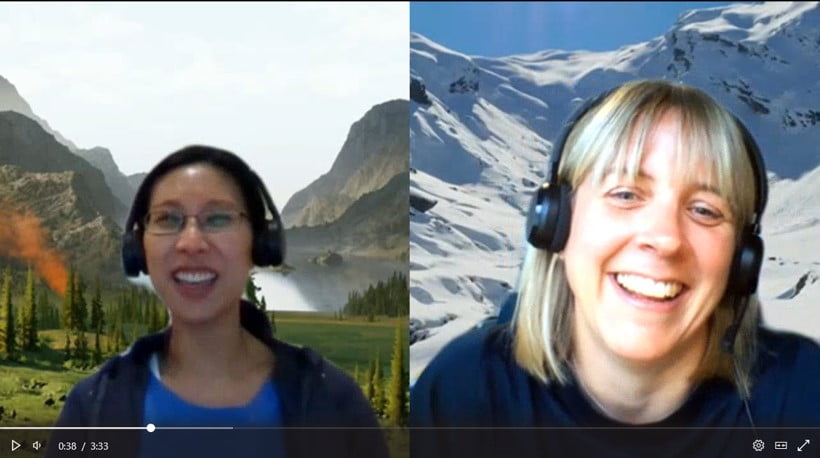
Cynthia had to move her initial sub-catchment stakeholder workshop to the virtual online world. So they worked together to create an engaging online workshop that would help facilitate IWM stakeholders identify their ‘why’.
In planning for the workshop, Karen organised informal workshops between Cynthia’s team at YVW and representatives from various teams at DELWP to explore the challenges of IWM policy and practice. These workshops allowed YVW and DELWP to build our relationship by speaking more informally about the challenges experienced when trying to implement IWM and how we could collaborate to overcome those challenges in the future.
Karen and Cynthia also identified other aspects important to IWM Sub-Catchment planning and sought advice from the Twinning alumni / organisers including from:
- Dr Siwan Lovett: Soft / enterprise skills to develop trusting relationships with stakeholders.
- Dr Tamara Boyd: Valuing natural assets for amenity and cultural values in funding applications / business cases.
Finally to Sub-Catchments
Cynthia hosted her virtual workshop with 15 stakeholder organisations using breakout rooms and collaborative online whiteboards. The design of the workshop was centred around helping stakeholders identify their ‘why’ to be involved in IWM sub-catchment planning. Feedback from participants indicated that they believed their participation in a collaborative process is important to achieve IWM outcomes for the sub-catchment. Wondering ‘why’? Well it’s thanks to the Twinning program.
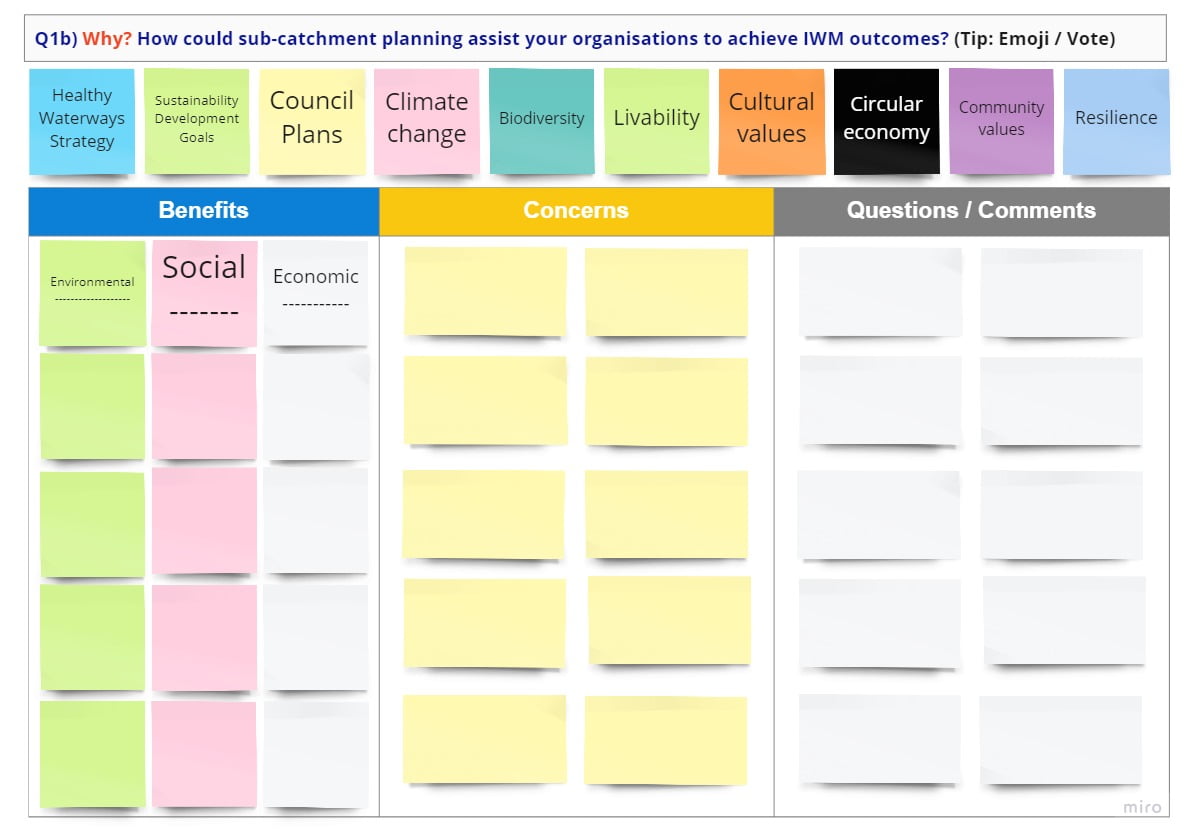
“The Twinning program has delivered benefits to my professional development and project in some unexpected ways. The mentoring relationship has exceeded my expectations by providing vital well-being support during the COVID pandemic as both my mentor, Karen, and I have similar school aged children. This support of each other has grown trust in our relationship to allow us to explore aspects of professional development which are often less spoken about like the subtle ‘art’ of communication. My Twinning project was to progress Integrated Water Management (IWM) sub-catchment planning in key focus areas. My project and whole team benefited from the opportunities to meet with her DELWP colleagues to informally discuss the challenges associated with the IWM concept. It was the informal nature of those meetings that allowed for a more open discussion, and I believe has contributed to building a stronger relationship with DELWP to collaboratively tackle the challenges as highlighted in the Productivity Commission’s recent report ‘Integrated Urban Water Management — Why a good idea seems hard to implement’.”
– Cynthia
“This is my first time as a mentor and I’ve felt well supported by the ‘Twinning’ program. Mentoring has helped me articulate so many things about what I know and how I do things – sometimes things I didn’t even realise I knew or did! Mentoring has helped me push my own boundaries and believe in myself more. COVID has brought many new challenges to working remotely and looking after ourselves and our loved ones. My mentee and I are both working at home with primary children remote learning at home. Having regular catch ups has allowed us both to share our ‘COVID’ experience of the very real juggle and have someone outside our immediate workplace to lean on. I’m also learning so much from my mentee about a different part of the water sector. The broader ‘Twinning’ cohort has also been a lovely source of shared connection, positivity and learning as we work and deliver remotely, whilst remaining passionate about our waterways.”
– Karen
The Waterway Management Twinning Program is a structured mentoring program, focusing on improving the on-ground delivery of current Victorian riparian restoration projects. This Program provides an opportunity for the most effective approaches to be shared and adopted between all those working in waterway management across the State.